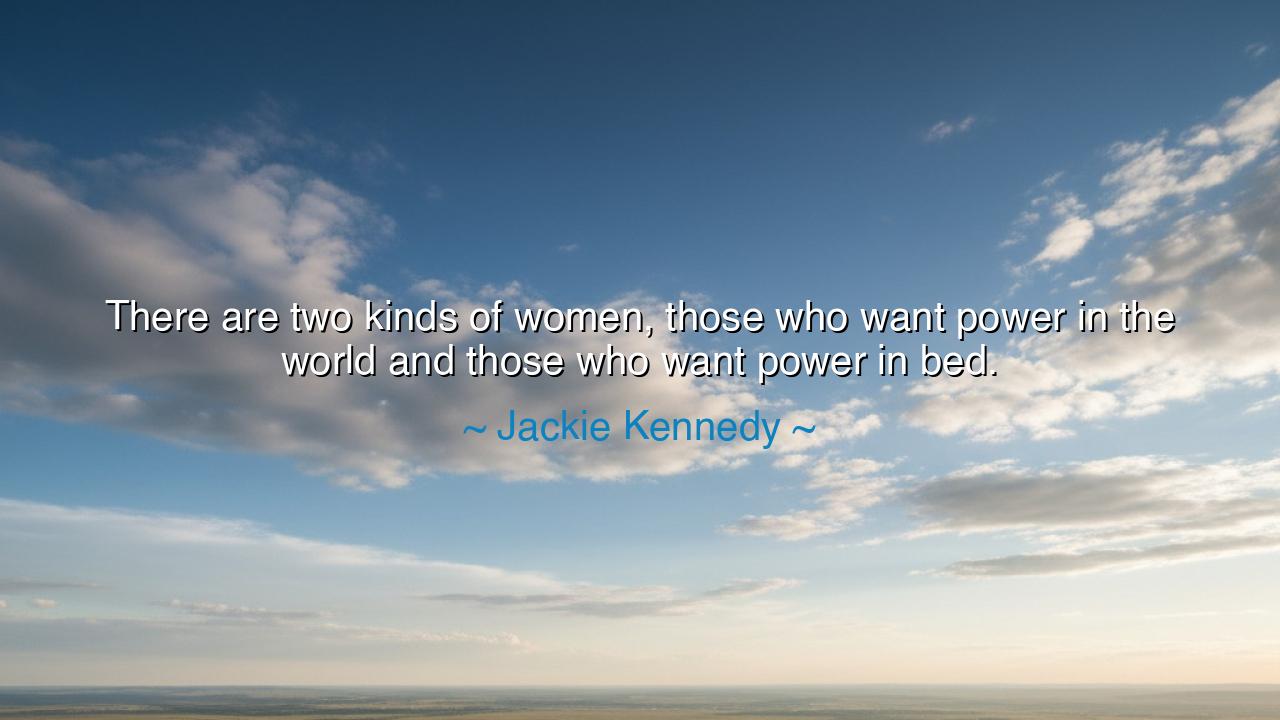
There are two kinds of women, those who want power in the world
There are two kinds of women, those who want power in the world and those who want power in bed.






The words of Jackie Kennedy — “There are two kinds of women, those who want power in the world and those who want power in bed.” — resound with the candor of one who walked among the mighty and witnessed both public grandeur and private intrigue. In them lies the recognition of two realms where influence is most keenly felt: the arena of politics and the chamber of intimacy. Both are domains of struggle, both are places where destinies may be shaped.
To seek power in the world is to stand among rulers, to lift one’s voice in councils, to mold the fate of nations. These are the women of statesmanship, like Cleopatra, who enthralled not only with beauty but with wit and command, swaying the might of Rome itself. Their ambition is not confined to hearth or home, but stretches across empires, their names written in marble and memory. Such women wield authority openly, challenging the order of men, yet also completing it, for without their strength, the world is poorer.
Yet there is also the power in bed, which, though hidden, is no less formidable. This is the dominion of intimacy, where hearts are swayed, kings undone, and decisions whispered in the stillness of night. Helen of Troy, whose beauty launched a thousand ships, did not hold a throne, yet her power drew nations into war. In the quiet domain of desire, women have steered the course of history with a subtler hand, their influence no less enduring than that of generals.
Jackie Kennedy, herself both participant and observer of the world’s stage, knew these truths intimately. As First Lady, she wielded soft power in the world through culture, charm, and diplomacy, shaping America’s image abroad. Yet she also lived within the private world of a marriage watched by millions, where power in bed and the dynamics of intimacy carried their own weight in shaping the lives of the powerful. Her words, though sharp, reveal a wisdom born from standing at the crossroads of both realms.
Let the generations remember: power takes many forms, and neither should be dismissed. The sword and the whisper, the throne and the bed — both have carved the course of history. Jackie’s reflection is thus not cynicism, but clarity: that women, like men, seek influence in the ways the world allows them, and in the ways it cannot forbid. To understand this is to honor the fullness of human strength, and to recognize that history is written not only in parliaments and on battlefields, but also in the secret chambers of the heart.






TATieu Anh
While it’s an interesting way of framing power dynamics, the quote feels very limiting. In reality, women, like all people, can seek power in various aspects of life: professionally, personally, emotionally, and even spiritually. Can we really say women only fit into two categories based on where they want power?
UGUser Google
I can see how some might interpret this quote as acknowledging the different ways women can influence their lives. But is it fair to suggest that women who desire power in the world are somehow separate from those who seek power in intimate spaces? What if both are important in shaping a woman’s identity?
BNBao Ngoc
This statement almost feels like a reflection of societal stereotypes that box women into certain roles. Is it possible that women can desire both types of power—or perhaps neither? What does this quote say about how society views female empowerment? Shouldn't there be more nuanced views of women's aspirations?
THTuanAnh Ha
I find this quote somewhat problematic. It assumes that power in one’s personal life is equivalent to power in the public sphere, which overlooks the many other ways women might define empowerment. What do you think? Does the quote oversimplify women’s agency in today’s world?
NNName No
While it might have been a provocative statement in its time, this quote seems to imply that women’s ambitions can only be understood through a lens of either societal dominance or personal relationships. I wonder, is this an outdated perspective, or do some still view women’s power in such narrow terms?